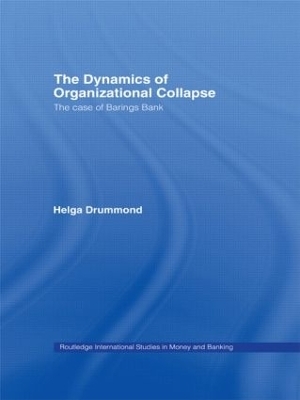
The Dynamics of Organizational Collapse
The Case of Barings Bank
Seiten
2012
Routledge (Verlag)
978-0-415-54270-8 (ISBN)
Routledge (Verlag)
978-0-415-54270-8 (ISBN)
International in its appeal, this book uses high-level and multi-theoretical analyses involving psychological and sociological theories to explore the events of Nick Leeson’s employment with Barings’ in Singapore in 1992 to Barings’ collapse in 1995.
The collapse of Barings’ Bank was a commercial catastrophe that resonated worldwide, showing what kind of secrets can lie behind an apparently successful organization. Following Nick Leeson’s arrest and subsequent conviction for fraud, investment banks anxiously reviewed their risk management controls to make sure that it could never happen again.
Helga Drummond’s exploration is conducted against a backdrop of social and psychological theories of decision error that seeks to go beyond media style accusations of greed and incompetence. She challenges the myth that Barings ‘must have known’ that mischief was afoot. The book offers lessons for all organizations as it shows how easily managers can end up living in a world of fantasy believing that everything is under control when the precise opposite may be true. It is not risk and uncertainty that should worry organizations, concludes Drummond, but what they are most sure of.
The collapse of Barings Bank had international ramifications, and this scholarly analysis will have an international audience as a result. The book will be of great interest to all those interested in social psychology, the application of psychology in management theory, sociology, and organizational behaviour. It is also suitable as recommended reading for a management or organization behaviour course.
The collapse of Barings’ Bank was a commercial catastrophe that resonated worldwide, showing what kind of secrets can lie behind an apparently successful organization. Following Nick Leeson’s arrest and subsequent conviction for fraud, investment banks anxiously reviewed their risk management controls to make sure that it could never happen again.
Helga Drummond’s exploration is conducted against a backdrop of social and psychological theories of decision error that seeks to go beyond media style accusations of greed and incompetence. She challenges the myth that Barings ‘must have known’ that mischief was afoot. The book offers lessons for all organizations as it shows how easily managers can end up living in a world of fantasy believing that everything is under control when the precise opposite may be true. It is not risk and uncertainty that should worry organizations, concludes Drummond, but what they are most sure of.
The collapse of Barings Bank had international ramifications, and this scholarly analysis will have an international audience as a result. The book will be of great interest to all those interested in social psychology, the application of psychology in management theory, sociology, and organizational behaviour. It is also suitable as recommended reading for a management or organization behaviour course.
Helga Drummond is Professor of Decision Sciences at the University of Liverpool Management School.
1. The Paradox of Consequences2. ‘A Third Rate Pisspot Bank’3. Failing Most Successfully4. The Dynamics of Power5. Did Nick Leeson Have an Accomplice?6. Analysing the Fatal Disconnect7. Agency, Structure and Organizational Collapse8. From Order Filler to Star Trader9. Analysis of Leeson’s Early Days10. Decision Error11. ‘A Million Bucks a Day’12. Analysis of the Final Weeks13. The Illusion of Control14. The Last Line of Defence15. Analysing the Illusion of Control16. Summary and Conclusions
| Erscheint lt. Verlag | 10.5.2012 |
|---|---|
| Reihe/Serie | Routledge International Studies in Money and Banking |
| Verlagsort | London |
| Sprache | englisch |
| Maße | 156 x 234 mm |
| Gewicht | 300 g |
| Themenwelt | Geisteswissenschaften ► Psychologie ► Allgemeine Psychologie |
| Geisteswissenschaften ► Psychologie ► Arbeits- und Organisationspsychologie | |
| Wirtschaft ► Betriebswirtschaft / Management ► Finanzierung | |
| Wirtschaft ► Betriebswirtschaft / Management ► Planung / Organisation | |
| Betriebswirtschaft / Management ► Spezielle Betriebswirtschaftslehre ► Bankbetriebslehre | |
| Wirtschaft ► Volkswirtschaftslehre | |
| ISBN-10 | 0-415-54270-7 / 0415542707 |
| ISBN-13 | 978-0-415-54270-8 / 9780415542708 |
| Zustand | Neuware |
| Haben Sie eine Frage zum Produkt? |
Mehr entdecken
aus dem Bereich
aus dem Bereich
warum unser Geld stirbt und wie Sie davon profitieren
Buch | Hardcover (2024)
FinanzBuch (Verlag)
30,00 €


